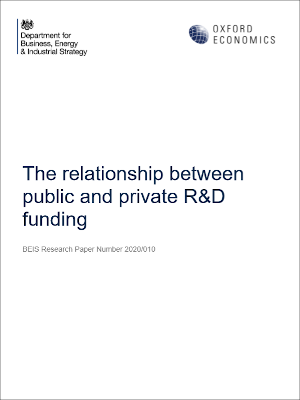Ungated Post | 17 Jul 2020
The relationship between public and private R&D funding

Oxford Economics was commissioned by the Department for Business, Energy and Industrial Strategy (BEIS), to assess the impact of public R&D support on levels of private R&D spending in the UK and other advanced economies.
Innovation enhances productivity and drives long-run prosperity. It can create new and improved products and processes, and generate cost savings for companies and the taxpayer, as well as numerous other benefits. However, a range of market failures mean that if left entirely to the market, the amount of R&D which takes place would be considerably less than optimal. These failures provide a strong case for government intervention to support R&D across the economy.
Against this backdrop, BEIS was looking to deepen its understanding of the impact of public R&D investment on private R&D investment. It commissioned Oxford Economics to undertake independent research to update the evidence base in this field using the most recent and comprehensive datasets, and through the application of the latest analytical techniques.
For the UK, we found that each £1 of public R&D stimulates between £0.41 and £0.74 of private R&D within the same year. In the long run, the same £1 of public R&D eventually stimulates between £1.96 and £2.34 of private R&D (inclusive of the impact in the first year).
Alongside our analysis of the UK, we estimated the link between public and private R&D rates for nine other OECD countries. We found a wide variation in the impacts of public R&D on private R&D across countries. The greatest impact was found for Japan, where £1 of public support would stimulate £3.16 of public investment in the long term. In contrast, the same £1 of public support in Spain would encourage just £1.21 of private investment.
Our economic consulting team are world leaders in quantitative economic analysis, working with clients around the globe and across sectors to build models, forecast markets and evaluate interventions using state-of-the art techniques. Lead consultants on this project were:
Oxford Economics’ team is expert at applying advanced economictools that provide valuable insights into today’s most pressing business, financial,and policy issues.
To find out more about our capabilities, contact:
EMEA
Sam Moore
+44 (0)207 803 1415
Email
Americas
Hamilton Galloway
+1 (646) 503 3068
Email
Asia
Rhianne Clark
+65 6850 0112
Email
Related Services

Post
The economic impact of abandoning the WTO
Oxford Economics have been commissioned by the International Chamber of Commerce (ICC) to provide an independent assessment of the economic impact of WTO dissolution. This report details our findings and the assumptions underpinning our analysis.
Find Out More
Post
The economic impact of the sports activities of public service media
This study shows how the sports activities of public service media supported €4.5 billion of GDP and 57,000 jobs across 31 European countries in 2022. The report also highlights wider economic benefits of public service media sports coverage, such as the way in which it leverages sponsorship income for sports bodies.
Find Out More
Post
Global Trade Education: The role of private philanthropy
Global trade can amplify economic development and poverty alleviation. Capable leaders are required to put in place enabling conditions for trade, but currently these skills are underprovided in developing countries. For philanthropists, investing in trade leadership talent through graduate-level scholarships is an opportunity to make meaningful contributions that can multiply and sustain global economic development.
Find Out More